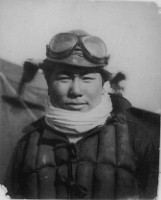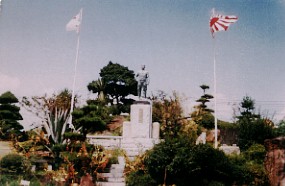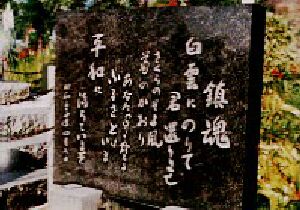|
|||||
|
To Everyone in Sangoku Village, Now I take leave of you with emptiness in my heart, looking forward
to meeting together again
Kaneyuki Fukuda |
|||||
|
Before Mr. Fukuda's sortie, these letters were sent addressed to his mother and to the Mayor of Sangoku Village in Mitsui-gun, Fukuoka Prefecture. Along with communicating a final farewell to his mother, he recalled Sangoku Village where he was born and raised. He probably had written while picturing the people of his hometown who gave him a send-off when he left for military service. The duty of military service, one of the three great duties in the former constitution, was carried out by the men of Japan. Going into military service was admired as an honor to one's family but also as an honor to one's hometown. Moreover, if someone died in battle, a "village funeral" would be held. Also, a sign saying "House of Honor" would be placed at the entrance of the family's home. It was a time when that honor was acclaimed. This writer also completed Navy flight training. When I joined the Kagoshima Air Group, friends and relatives gathered and held a send-off party for me. On the day of departure I went with relatives to visit the shrine of our guardian gods and to pray for success in battle. As I walked to the nearby train station, there were banners of congratulation waving in front, and the elementary school band was playing military songs. I received encouragement from friends and neighbors, and we exchanged words of farewell. At the square in front of the
station, I stood before everyone who had given me this send-off. I said my final
farewell and told them of my determination to do well in the military. At the
end I expressed my thanks for the send-off. And with three shouts of "banzai"
from the crowd, I boarded the train. Along the train line, people in the
countryside would come out in full force and wave small Japanese flags to give
us a grand send-off as my hometown lay behind. After the eruption of the China
Incident, it was customary to send off soldiers one after another with this type
of send-off. Dear Tomo Itoo, Every day it has been hot here. Thank you very much for your letters. As the air raids intensify each day, I imagine that there you must be having a difficult time. Luckily up to now we here have not had any air raids nor even the slightest damage. Even though I received your letter the other day, I have been busy with one thing and another. I truly apologize for not sending a reply sooner. Please do not think badly of me. Thank you very much for today's dear letter. Just like you I have been anxiously waiting for the coming announcement. Even though I have looked at the newspapers many times, the children's names have not appeared. In our home we are already saddened. Actually, when I went to visit Kagoshima I brought a letter from someone in Kurume. When I went to Kurume to inquire right after the latest announcement, they were very discouraged even though there was no announcement about their son. Surely the parents' hearts thinking about their child remain the same. On April 24, I managed to arrive at the base in Kagoshima, which was experiencing heavy air attacks. I visited with my son who I had not seen for a long time, but at that time I did not see anyone else other than a young man from Yawata when the two came to a visiting area. I just gave a letter to pass to your son, and I did not see your son Norio. The base at Kokubu in Kagoshima Prefecture is on top of a really high hill. We talked for about two hours, but we soon had to go down the mountain to catch a train. My son told me that when they were going to leave their original unit, everyone would treat them specially by adorning them with cherry blossoms. However, afterward there was no news, but about the middle of May a person from Kagoshima told me that he had departed on April 28. After about 20 days passed, I also heard in a letter from the person on the right that a young man who had departed together with my son developed engine trouble along the way and had to come back. Those two people clearly told me, "The deaths of Mr. Fukuda and the others were at 7 p.m. on the 28th." They gave this news to me. When my son was still at the base, the person on the right is the one who went to comfort the Kamikaze pilots on departure. Based on this, my son must have departed Kagoshima on April 28. Afterwards, I heard that not one plane returned. Although I have given up hope of him still being alive, my heart will not be calmed until I see the announcement. I also was just thinking I would try asking you for news. I really do not have any idea what happened. I do not even know the names of those of his unit. Even when I went to visit, it was just a short visit with no detailed talk. Really I should have sent you a prompt response, but please forgive me. Please do not think badly of me for not sending anything until now. This is just a quick response. Kaneyuki's Mother, Teruko Kaneyuki
Fukuda's mother, Teruko, wrote this letter to the mother of Norio Itoo, who also
sortied with the No. 2 Seitoo Kamikaze Corps. In the midst of heavy air attacks,
she met her son who was facing death, and one wonders what words were exchanged
at his final farewell. The above letter communicates the fears of mothers
worried about their sons' situation and searching for some news. |
|||||
|
|||||
|
The distinguished accomplishments of the No. 2 Seitoo Kamikaze Corps to which they belonged were made known to the entire military in Combined Fleet Bulletin No. 145 dated August 7. However, their names were not made public at that time, and the notification of their deaths in battle reached their families in October 1945. On April 6, 1979, Mizobe Town in Kagoshima Prefecture erected a Special Attack Forces Memorial in Uwatoko Park, which looks down upon the former Navy's No. 2 Kokubu Base, used for sorties of carrier dive bombers in the Battle of Okinawa. The Special Attack Corps composed of flight corps from Hyakurigahara, Nagoya, and Usa Air Bases and the 951st Air Group took off from the base here to attacks from which they did not return. This is where many young men in the Special Attack Forces,
such as Mr. Fukuda, along with Mr. Itoo, Mr. Ono, Mr. Urushidani, and others, gave their final farewell to their country. |
|||||
|
|||||
| Translated by Bill Gordon March 7, 2004 |
|||||


